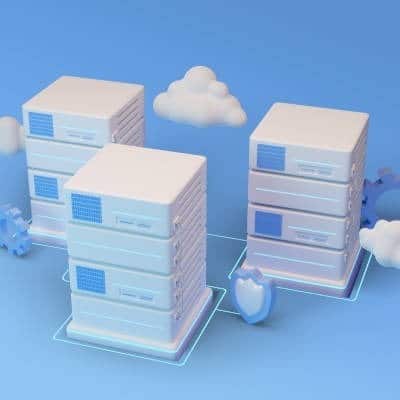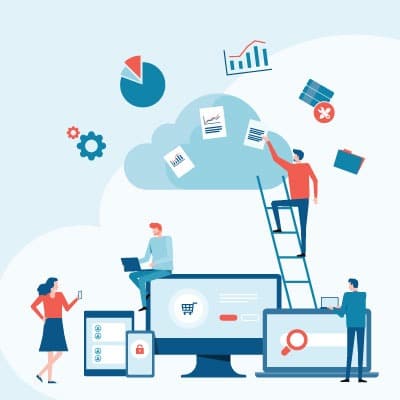Microsoft 365 comes in three different delivery models: Home, Business, and Enterprise. The confusion comes from the fact that the company launched Microsoft 365 that provided Office 365 and a hosted Windows 10 with user controls to businesses of all sizes. Let’s briefly take a look at each offering to remove any confusion you may have. Microsoft 365 Home The home edition of Microsoft 365 comes in two packages and includes the following software: Word – Microsoft’s word processing application Excel – Microsoft’s spreadsheet application PowerPoint – Microsoft’s presentation building application OneNote – Microsoft’s note taking application Outlook – Microsoft’s email application On Windows 10 PCs users also get access to Publisher, a typesetting application. The subscription also includes OneDrive with 1 TB of cloud storage and access to Skype, Microsoft’s video conferencing application. The home edition of Microsoft 365 is available per user or in a family plan that provides up to six separate personal accounts. Microsoft 365 Business The business edition of Microsoft 365 comes in three different packages and includes the Office package as well as access to the following applications: Teams – Microsoft’s collaboration application Exchange – Microsoft’s email, scheduling, and task management application SharePoint – Microsoft’s project management application The business edition of Microsoft 365 comes in Business Basic, Business Standard, and Business Premium. The basic edition only provides access to web-hosted applications, while the Premium package includes Microsoft’s Intune software and additional security features. Microsoft 365 Enterprise The enterprise edition of Microsoft 365 is a complete overhaul of a business’ productivity platform. It comes with everything from the Business Premium package and adds access to several other applications designed to help improve business management, productivity, and security. Some of the additional services include: Microsoft Bookings Microsoft Yammer Microsoft Stream Microsoft Sway Microsoft’s task management suite Advanced analytics Device management Identity management Threat protection Advanced compliance …and more. Microsoft 365 Enterprise is available in three service models: E3, E5, and F3. If you would like to know more about Microsoft 365, call our team of IT professionals at (831) 758-3636 today.
Data Automation Explained Data automation is the collection and transcription of data using automated software systems. Some include new AI capabilities that help the system enter data and learn about it faster. This system takes the onerous task of entering data and automates it. With this process being handled by a computer, you can save money on your payroll outlay, or you can reassign staff to accomplish other tasks aimed at building more consistent revenue streams. How Does Data Automation Help? There are several ways that a small business can directly benefit from data automation. They include: Time (and thereby, money) is saved Your team is free to focus on other responsibilities Data can be entered more accurately and efficiently Think about the grocery check-out at your local supermarket. For years, the cashiers had to manually look up and enter the prices of the products and it took a long time. After a while the pricing gun was developed and it sped the system up somewhat, but today, with the use of technology, each product (and its price) is tracked by barcode. Now the barcode scanners pick up the price, the expiration date, and all other relevant information (e.g. if an ID is required) for a product, making the whole process substantially faster and more efficient. Does This Technology Seem Right for Your Business? For more information about data automation or any other tool that can help your business get more efficient, call the IT professionals at SRS Networks today at (831) 758-3636.
A firewall is useful but isn’t going to do much to help if your server is on fire. Thankfully, we have Backup and Disaster Recovery (BDR) solutions to help businesses protect their data and their operational continuity. Whether you’re in the office, or anywhere from Akron to Zimbabwe, a BDR can help protect you from disasters and data loss of all kinds. Look at it this way: would you ever go on a business trip without a spare set of clothes? Of course not—what if some shrimp cocktail dribbles onto your shirt during a mixer? Networking is a lot less effective with a stain that reeks of horseradish and crustacean. You can think of data loss as the shrimp cocktail stain on your business—albeit to a much larger degree—in that it makes you look really bad. Think about it! A business losing huge chunks of their essential data is a terrible look and guaranteed to repulse a lot of their clients and prospects. So, just as you bring a spare set of clothes to the business trip, you want to make sure you have the means to restore your data should something happen to it. You want to be sure you have a backup in place. A BDR enables businesses to protect their data, with the confidence that it can always be recovered if the worst were to happen. The network-attached BDR backs up your data as often as every quarter of an hour on hard drives to give you quick and easy access. Meanwhile, a copy is also stored offsite in a storage facility. As a result, if your hardware and the BDR device are to be compromised, this redundant data is left untouched and safe. Obviously, this sounds far better than manually saving files to the cloud, or saving them to portable drives, or—worst of all—saving all your data to a tape backup, relying on moving parts and antiquated technology. That’s like bringing a clown suit as your emergency change of clothes. The BDR, on the other hand, is a tailored and reliable ensemble waiting in the wings. Don’t let an unlucky break create a gaffe like data loss. Reach out to our team of IT professionals to learn more about how SRS Networks can help protect your data. Give us a call at (831) 758-3636 today.
Are You Still Working On Your Business? Most entrepreneurs look to other entrepreneurs to provide the knowledge base they need to successfully grow their businesses. That means when your business has grown to the point where you need to shift your strategy, you’ve actually already made it. It’s likely that while your business was in its infancy, you both worked in it, and tirelessly worked on it. You may not have to work in it as much now, but if you don’t focus on working on it, there are many roadblocks to progress you could encounter. Information Technology’s Role Of course, IT has played an expanded role in businesses for a while now. The only way a business can keep growing is by having efficient operations. Of course, IT helps promote efficiency and security, two major parts of a successful business. As your business enters the mid-market, however, you will likely be looking to expand the technology your business relies on. Solutions like document management, inventory management, and business intelligence typically work off of your other IT initiatives and can help expand your offering by promoting end-to-end efficiency. Management of Growth Some entrepreneurs have a difficult time when their role shifts from team leadership to company leadership. Once a business sees a plateau in growth due to a reluctance to innovate or a failure to properly delegate responsibilities, it may not recover. Once your business has grown to the point where you can’t actually control every move it makes, you need to back off and let the people you pay do their jobs. Failure to do so can even stall a business at a time when it should be advancing and looking to break into new markets and diversify its revenue streams. One of the biggest benefits to company growth is the ability for your team to think independently and solve problems. Entrepreneurs typically hire people that they can control and that agree with them. If you can find skilled labor that can present you with new ideas, and not depend on yes men, your business will be the better for it. Outsourcing Is Effective Sometimes, when your business gets to the point where it isn’t functioning as a small business anymore, the best thing to do is to scale up or back. The easiest way to accomplish this is through outsourcing. There are people in all manners of work that you can lean on to do a job that you wouldn’t need a full-time employee for. These services typically come with favorable financial terms and can be contracted until they complete a job and then let go when they are no longer needed without the problems that accompany turnover in human resources. If your business doesn’t necessarily know where to go from here, call the IT experts at SRS Networks today at (831) 758-3636. We can take you through some options that can provide you with the powerful new tools needed to keep your business growing fast.
Remote Work and Distance Learning While neither working from home or learning online are exactly new, they have exploded in popularity due to recent events. While today’s technology—like Virtual Private Networking, cloud productivity and collaboration tools, and remote monitoring and management—makes these processes much simpler, there are a lot of challenges that these capabilities also present. Considerations like data security, the impact that isolation can have on employees and students alike, and how well certain tasks can be performed are all obstacles to these functions. However, with the right technology, these concerns can be mitigated or resolved so that your processes aren’t left insecure. Online Commerce With the fear that the nature of the current pandemic strikes within so many, combined with the restrictions and safeguards that businesses have put into place, alternative means of doing business have become a huge priority. Specifically, online commerce, the perfect joining of business and social distancing. With businesses no longer able to operate in the way that they are used to, embracing the capabilities that the Internet provides will be critical to their survival. There are still safeguards that naturally need to take place when selling goods and services, only added to those that selling these goods and services online always come with. However, these safeguards are what will help to protect your clients and customers, and therefore preserve your business moving forward as revenue comes in. Digital and Contactless Payments In those businesses whose operations aren’t well-suited to transition to online, alternative means of accepting payment will be important for businesses to adopt so that infection can be minimized as much as possible. With digital payments coming into the fore, this is now made much simpler. Contactless digital payments and online payments alike give you, your clients, and customers an added level of safety and security. Communications Okay, we promised to mention something silly, and here it is. With many people wearing face masks to help stem the spread of COVID-19, a lot of people have discovered a few minor (but frustrating) challenges in doing so. For instance, communications. When wearing a mask, speaking on the phone can become challenging, which is why there is now another device—the c-mask, a smart mask—available to assist them. I wish I was kidding about this, but there is now a device available to attach over your face mask that connects to a mobile device via Bluetooth and allows you to dictate messages and send calls, even translating them to a different language with a subscription. It might look kind of weird, but if it works well, that’s pretty neat. Otherwise, the pandemic has also put the importance of communication to the fore, while 5G and other useful communication technologies have unfortunately been delayed. Hopefully, the issues surrounding 5G will be addressed and overcome so that 5G can be used to help benefit businesses as they regroup and recover. How has your business used technology to sustain itself? Share your experience in the comments!
It was discovered that users who set a particular image as their phone wallpaper on Android devices suddenly found their phone crashing. Once the wallpaper is set, the phone will refuse to boot back up, even in safe mode. This means the only way around it is a hard factory reset, which will lose everything on the phone that isn’t backed up elsewhere. Users are able to safely view the image, and even download the image on their device. The issue occurs once the image is set as a background wallpaper on Android devices, especially newer phones, and it seems to affect Samsung phones especially. Let’s Take a Look at the Infamous “Cursed” Android Wallpaper In a Twitter post by user @Universeice, we get a glimpse of the image and the warning not to set it as a wallpaper. Definitely heed our warning and do not attempt to make the image your wallpaper, but it is safe to view: WARNING???Never set this picture as wallpaper, especially for Samsung mobile phone users!It will cause your phone to crash!Don’t try it!If someone sends you this picture, please ignore it. pic.twitter.com/rVbozJdhkL u2014 Ice universe (@UniverseIce) May 31, 2020 Why Does This Image in Particular Break Android Phones? After doing a little research, this photo was taken last year by photographer Guarav Argawal, and ended up on a lot of popular smartphone wallpaper sites recently. Argawal owns the copyright to the image, which means it probably should not have been made available on these wallpaper sites. The issue has to do with hidden data stored within the file itself. There isn’t anything malevolent going on here – any image can have hidden metadata stored within it. Most digital cameras, for example, record the type of camera and settings used, the time and date, and other information automatically when taking a photo. There is a specific type of data called the ICC profile, which has details about the color profiles of an image. All of our modern-day devices have limited colors that they can actually display. Our eyes are pretty limited to what colors we can see, so it doesn’t usually affect us. Color profiles set standardized ranges of colors used in an image that devices can use so colors are relatively uniform across our devices. Ask a graphic designer or photographer and they will have a lot to say about their frustrations with color profiles. That said, the ICC profile used on this image was a fairly uncommon one, and likely not something that Android was configured to use for a Wallpaper. In fact, simply saving the image using a standard color profile makes it safe to use, although it does make the image a little more visually dull. The craziest part about this image, is that if it weren’t for a single pixel, it would likely work just fine. Combined with the uncommon ICC profile, there is a single pixel (a tiny, nearly invisible dot of color) that causes the actual conflict that crashes Android phones. You can’t see it by looking at it, but somewhere in the pinkish lining on one of the clouds is a single pixel that most modern smartphones just can’t handle existing on the wallpaper! Okay, I Won’t Set This Image as a Wallpaper. Am I Out of […]
First of all, what is a CRM? CRM stands for Customer Relationship Management, which is the technology that assists your business in tracking and cultivating your interactions with those you work with, pretty much as it says on the box. Not only does this help you keep track of all your business contacts, the many integrations that can be found for these kinds of solutions give you additional resources and capabilities to use to your advantage. Let’s go over the common integrations that CRM solutions offer to help you improve your business processes. Calendar Integration When you need to keep track of your customers and interactions you have with them, establishing a schedule to stick to is an important step. After all, you don’t want to have meetings overlap with your other activities and cause conflicts. Utilizing a CRM that integrates with your business calendar to helps you avoid overscheduling your activities, while also ensuring you are prepared to sustain your interactivity with your contacts. By automatically syncing your calendars to the events outlined in your CRM, your team can keep your projects and initiatives in progress while minimizing any potential scheduling and internal communication issues. Call Center and Customer Support Integration Your CRM solution should also work collaboratively with your external customer service and support tools. Let’s say that one of your customers reaches out to you with a question for your support team. It doesn’t make sense for your sales team to answer the call first, so a system that can direct these calls to the appropriate party from the get-go leads to increased productivity and improved customer relationships. Syncing these two solutions together can lead to impressive improvements across the board. Email Integration Many businesses also rely on email communications to keep in touch with their clients and customers. Using a CRM to power these communications can assist a business in lead generation and more personalized marketing efforts. Using a CRM to its full potential can help promote your operations and entice your prospective customers to reach out to you more often, often assisted by the integrations that are incorporated into it. For more ways that you can use your technology to increase your business’ productivity and efficacy, subscribe to this blog, or give SRS Networks a call at (831) 758-3636.
Defining Each On-Premise Solutions On-premise solutions are those that a business keeps in their office, on privately-owned and maintained servers. The actual makeup of these solutions varies from business to business, as it is dictated by each business’ needs. Cloud Solutions As you might imagine, cloud solutions are mostly those that are hosted off-premises. The cloud is a fanciful term to what amounts to data centers filled with servers, dedicated to providing invaluable services and resources to the businesses that rent them out. Let’s consider the positive aspects to each, as well as how these aspects measure up to the other’s less-positive features in comparison. Benefits of an On-Premise Solution One of the primary benefits of a business hosting its own server is the idea that control remains in the business’ hands. If a power outage—a basic and common enough business continuity threat—were to strike, a business hosting its own solutions on its own hardware could mitigate it effectively by turning to a backup power source until the outage was resolved. Comparatively, a business relying on cloud-hosted solutions also relies on the cloud provider to prevent downtime. In a similar vein, a business with control over its infrastructure is therefore in more control over its security. In theory, this means that a business can ensure its security is best suited for its environment and needs when its resources are kept in-house, close to the chest. Whether or not this is the case, however, also depends on the business. Benefits of a Cloud Solution Comparatively speaking, a cloud-hosted solution is going to be much more cost-effective for a business of any size to implement. For one, you aren’t obligated to pay for any more resources than you need in the moment, as you would when investing in your own hardware. This freedom gives you considerable flexibility to scale your use of the cloud as needed. In addition, you also don’t have any responsibilities directly associated with maintaining this hardware, eliminating those expenses as well. This also frees up your internal teams to focus on other priorities and projects. Of course, there are drawbacks to choosing exclusively between one or the other option. With on-premise servers, any upgrades are based on your schedule and your business’ financial capabilities, while cloud servers may not always be available (leading to downtime) and potential data security concerns are another concern that an on-premise server doesn’t have. This is why many businesses settle somewhere in the middle and elect to use both, in what is called a hybrid cloud, utilizing the best of both worlds. SRS Networks can help you determine which of these options is best for your business’ circumstances. Talk to one of our consultants today by calling (831) 758-3636.
Explaining VoIPA VoIP solution hosted in the cloud is a full-featured telephone system for your business. In these troubling times, more businesses have begun to look to a hosted VoIP system than ever before. Chances are that your business already pays for more bandwidth than it uses. This extra bandwidth is just wasted money but utilizing it would stretch your budget further. VoIP provides that opportunity. By cancelling your overpriced business telephone system and switching to a cloud-based VoIP system, you will save money and enjoy some of the following benefits: Access to Expert Technicians – Maintenance is critical for the effectiveness of your VoIP system. If you host it in-house, you unfortunately have to take care of the maintenance of it yourself, which can be difficult and costly, but if you choose a cloud-hosted option the provider will manage the solution. Important Security Benefits – Rather than risk a breach happening, today’s VoIP platform protects you with encryption. Every call’s data is encrypted before it leaves for its destination, thereby protecting your business’ assets in a way that may not be possible otherwise. Increased Mobility – A hosted VoIP solution gives your business many additional opportunities to boost productivity and efficiency. For example, being able to simply forward a call to a user’s smartphone creates the mobile support that many businesses find ideal today, and that can really work as businesses figure out their next move. Powerful Features – One of the most important features of the hosted VoIP platform is the myriad of features that can be provided alongside the dynamic telephone service. Not only are there dozens of calling features, a hosted VoIP platform gives you the option to add video conferencing, instant messaging, and more. It doesn’t matter if your business has 30 employees or 300, a hosted VoIP solution is right for you, if you are looking to embrace mobility and improve efficiency. Call SRS Networks today at (831) 758-3636 to learn more about switching your business’ telephone system to VoIP.
Let’s pretend that all data is represented by books in a library, which itself represents the database. Now, consider what a library would be like without the Dewey Decimal System. All the books would be stuffed into the shelves haphazardly, no rhyme or reason to them at all. It would be practically impossible to locate any of the information you were trying to find. The Dewey Decimal system serves the same purpose in the library as the database management system (DBMS) does for your database. What Does the DBMS Actually Do? True to its name, the database management system enables you to manage your database. More specifically, it assists you in keeping your data organized and secure, while also helping you keep track of the activity taking place in your database. One of the biggest advantages of a DBMS is the fact that it gives you so much control over your data, while also adding convenience. For instance: A DBMS allows you to restrict access to data that an end user has. Users have a simpler time finding the data they need. It eliminates the need to restructure data to use different programs. Administration procedures can be unified. A DBMS makes data processing more economical. Data inconsistencies between file systems are eliminated. A DBMS allows for simultaneous data access between multiple users. In short, a database management system makes your users’ jobs simpler to carry out, without sacrificing the security of, or control over, your data. SRS Networks can help you implement the organizational tools you need to remain productive. To discuss your needs with one of our professionals, give us a call at (831) 758-3636.










